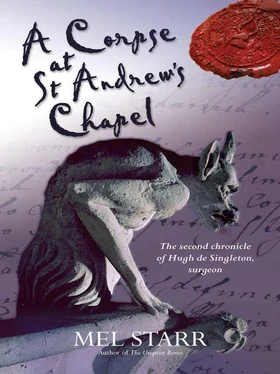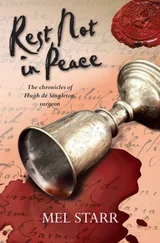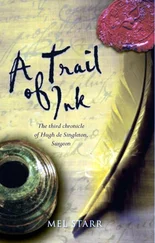Mel Starr - A Corpse at St Andrew's Chapel
Здесь есть возможность читать онлайн «Mel Starr - A Corpse at St Andrew's Chapel» весь текст электронной книги совершенно бесплатно (целиком полную версию без сокращений). В некоторых случаях можно слушать аудио, скачать через торрент в формате fb2 и присутствует краткое содержание. Год выпуска: 2010, Издательство: Kregel Publications, Жанр: Исторический детектив, на английском языке. Описание произведения, (предисловие) а так же отзывы посетителей доступны на портале библиотеки ЛибКат.
- Название:A Corpse at St Andrew's Chapel
- Автор:
- Издательство:Kregel Publications
- Жанр:
- Год:2010
- ISBN:нет данных
- Рейтинг книги:5 / 5. Голосов: 1
-
Избранное:Добавить в избранное
- Отзывы:
-
Ваша оценка:
- 100
- 1
- 2
- 3
- 4
- 5
A Corpse at St Andrew's Chapel: краткое содержание, описание и аннотация
Предлагаем к чтению аннотацию, описание, краткое содержание или предисловие (зависит от того, что написал сам автор книги «A Corpse at St Andrew's Chapel»). Если вы не нашли необходимую информацию о книге — напишите в комментариях, мы постараемся отыскать её.
A Corpse at St Andrew's Chapel — читать онлайн бесплатно полную книгу (весь текст) целиком
Ниже представлен текст книги, разбитый по страницам. Система сохранения места последней прочитанной страницы, позволяет с удобством читать онлайн бесплатно книгу «A Corpse at St Andrew's Chapel», без необходимости каждый раз заново искать на чём Вы остановились. Поставьте закладку, и сможете в любой момент перейти на страницу, на которой закончили чтение.
Интервал:
Закладка:
The woman remained silent for a time, but finally spoke. “May be there be two shoemakers in Witney. The town is grown larger now than Bampton…so I hear.”
“No. Larger it may be, but it supports but one cobbler. Shall I tell you where your husband found his shoes, or would you tell me?”
“They was gone when the coroner’s men brought ’im to me. Who so struck ’im down made off with ’em…one o’ Lord Gilbert’s men, an’ likely. It be your work to find ’em an’ return ’em t’me.”
Emma spoke this accusation with some heat. Either she knew not where her husband came by his shoes, or she was a skilled dissembler.
“The shoes have been returned to their rightful owner,” I replied.
“Nay! No man brought Henry’s shoes to me.”
“He was not the rightful owner, nor are you. Do you tell me how he came by them, or must I tell you?”
“Dunno what you be talkin’ of. My man is dead an’ murdered an’ had ’is shoes stole an’ you come to me talkin’ foolishness.”
The woman’s voice had increased in both pitch and volume, so that her children looked up from their bowls — which were now near empty anyway — with large and frightened eyes. I think they had heard such conversations before, and knew a fight might follow.
“Very well,” I shrugged. “The shoes your husband wore were first on the feet of Alan the beadle. Your husband took them from him.”
Emma knew well the truth of my assertion. Her mouth opened twice, as if she was about to speak denial, but closed again, like a fish gulping water in Shill Brook.
“I have returned them to the beadle’s wife.”
“’Tain’t right. They was Henry’s shoes,” Emma muttered. But the heat was gone from her voice. She was giving up the fight. I pressed for final victory and withdrew my purse from under my cloak. The woman watched with curiosity as I withdrew from it the blue thread found in Alan’s hair.
“Does the color strike you? Have you seen such before?” I asked.
“Nay…’tis blue…what of it?”
“This fragment was found in Alan’s scalp, when his body was found.”
Next I withdrew the threads I had pulled from the cotehardie now buried with her husband. “These came from the garment you buried Henry in yesterday.” I held the threads before her eyes. Even dark as it was in the hut, the similarities were clear.
“Henry wouldn’t kill nobody for ’is shoes,” she protested.
“Perhaps not. But he had no objection to taking them from the dead.”
The woman looked again at the threads, her brow furrowed, as if considering whether or not she was in a fight worth waging. Her eyes fell to the dirt at her feet. That was her answer.
“What was your husband doing on the road to St Andrew’s Chapel? His work on the bishop’s new barn would not take him that way.”
Emma curled bare toes into the packed earth of the floor of her hut, and finally replied.
“My Henry was a Christian man. Went to confession reg’lar…not like as them who confess but once a year for Lent.”
“He went to the priest at St Andrew’s Chapel to confess? Not to the vicars at St Beornwald’s Church?”
“Nay…would only seek absolution from Father John, none other.”
“Why so?”
The woman was silent again for a time, then replied, “Said as ’ow John Kellet was not so harsh in penance as was them of St Beornwald’s.”
I had heard Thomas de Bowlegh speak of penance and the judgment a priest must use in dispensing it. If the penance was too harsh, the sinner might forgo its completion and doom his soul to hell. But if the penance be too light, it may not absolve the sin, and so condemn the man to thousands more years in purgatory. Unless, of course, the sinner was a gentleman and could endow a chapel or chantry. Then a lighter penance might be called for. But for Henry atte Bridge such a consideration would not apply. He would earn his way out of purgatory by deeds, not money, for of that he had none.
“A question asked in confession,” I replied, “is, have you found anything and kept it? I wonder how your husband made answer?”
Emma considered my remark rhetorical. She made no reply. Her arguments were defeated, but there was yet some fire in her eye. I spoke next a concern which had troubled me since I rose that morning and set off to visit the Weald.
“You are not to vex the beadle’s widow. She is Lord Gilbert’s tenant and so comes under my bailiwick. She dwells on Catte Street, as you may know. I think you will have little business on that lane, so I would not like to discover that you have been seen there.”
I tried to impart my most stern expression, but the woman scoffed and turned to her children. A bailiff should be known for potential, if not real, severity (as well as avarice, which is their most widely remarked trait). I had not yet developed that reputation. I am uncertain whether this made my office more or less tedious. A bailiff may succeed in his work if he is feared, or perhaps if he be admired. I noticed neither dread nor veneration from those I governed for Lord Gilbert Talbot. I thought as I left Emma and her hut in the Weald that my tenancy in the office of bailiff might not be long, and that soon I would again be only Master Hugh, surgeon.
A cold, misty rain began to fall as I approached the castle. John Holcutt would see little work done this day. In the meadow west of the castle Lord Gilbert’s cattle bunched together as if the compact herd might drive off the chill and wet. As I passed under the portcullis Wilfred the porter saw me pass his post and called after me.
“Master Hugh! Father Thomas’ clerk was here but a short time ago. The vicar wishes for you to attend him…when you have leisure.”
I thanked the porter for this announcement and turned from the gatehouse to make my way to the town. The truth was, I had much leisure on such a day, although it was also true I would prefer to spend it in my chamber. I might call for a fire to be laid in my hearth. Perhaps, with good fortune, the comely Alice might be sent to perform the task.
I thought on that agreeable scene while I crossed the bridge over Shill Brook — I did not pause to examine the current this day — and into the town. The vicarage, that occupied by Thomas de Bowlegh, was north of St Beornwald’s Church on Laundell’s Lane, so I wrapped my cloak snug about me to ward off the wet and chill and hurried up Church View. I saw no other soul about. Such a day would be expected and considered mild in February. But April is not to deal so with men, and we take such weather as a kind of betrayal. Smoke drifted heavily in the cold mist from chimneys and gable vents. The burghers and townsmen of Bampton had no wish to leave their firesides this day. Nor did I.
After much thumping on the vicarage door that heavy oaken portal finally opened. The vicar’s hearing grew weaker each year. Soon, I think, he must give up hearing confession, or, in order to be heard the penitents will need to shout so that the whole town will know of their misdeeds.
“Ah…Master Hugh. I am sorry to bring you out on such a day, but we — Father Simon and Father Ralph and I — are in agreement that the business of Henry atte Bridge must be speedily resolved.”
I tried to make my face blank while the vicar spoke. I knew where this statement might lead and had no wish to go there. Father Thomas surely suspected this, and was prepared.
A great fire burned on the vicarage hearth. He drew me to it and bid me be seated on a bench placed close before the blaze.
“John!” the vicar thundered through an open doorway to a servant. “Bring wine.”
Wine, not ale. Surely the vicars of the Church of St Beornwald wished something important of me. Thomas spoke of the intemperate weather while the servant filled our cups with malmsey, but when the man departed — to listen behind the door, I’m sure — he came readily to the point.
Читать дальшеИнтервал:
Закладка:
Похожие книги на «A Corpse at St Andrew's Chapel»
Представляем Вашему вниманию похожие книги на «A Corpse at St Andrew's Chapel» списком для выбора. Мы отобрали схожую по названию и смыслу литературу в надежде предоставить читателям больше вариантов отыскать новые, интересные, ещё непрочитанные произведения.
Обсуждение, отзывы о книге «A Corpse at St Andrew's Chapel» и просто собственные мнения читателей. Оставьте ваши комментарии, напишите, что Вы думаете о произведении, его смысле или главных героях. Укажите что конкретно понравилось, а что нет, и почему Вы так считаете.












